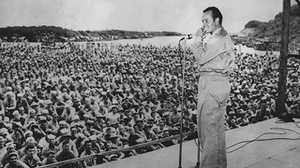17th President

Terms: 1865-1869
Political Party: Democrat
First Lady: Eliza McCardle Johnson
Vice President: None
Overview
Born: December 29, 1808, in Raleigh, North Carolina... A Southern supporter of the Union who balanced the ticket in Abraham Lincoln's 1864 reelection, Johnson led the Southern Reconstruction effort following the president's assassination. Conflicts with the Radical Republican Congress and his own ineptness led to an impeachment trial; Johnson was acquitted in the Senate by one vote... Died: July 31, 1875.
The Era
1866: Alfred Nobel invents dynamite
1867: Barbed wire, integral to the settling of the American west, is patented
1867: Canada becomes an independent nation in the British Commonwealth
1869: Suez Canal completed
Domestic Policy
The issue that vexed the nation following the Civil War was how to re-form the Union. Northern Republicans insisted that the South must work to ensure the enfranchisement and civil rights of the freed blacks. Johnson decided that the Southern states were only required to swear fealty to the Union and incorporate the 13th Amendment, abolishing slavery, into their state constitutions -- all else was up to the states themselves. When Congress sent the Army to govern the Southern states, Johnson fired his secretary of war in order to take command of the army himself. These actions led the House to adopt 11 articles of impeachment. His trial in 1868 resulted in his acquittal by one vote in the Senate.
Foreign Affairs
As with Lincoln, domestic affairs dominated Johnson's presidency. Johnson kept Lincoln's secretary of state, William H. Seward. Seward was mocked for arranging to purchase Alaska from Russia in 1866 ("Seward's Folly") but his decision has since been reappraised. Following the Civil War, Seward also sent veteran troops to the Mexican border, demanding that the French withdraw their puppet government, which they did in 1866.
Presidential Politics
Representing Tennessee, Johnson was the only southern Senator who chose to remain loyal to the Union while his state seceded. A hero in the North, Abraham Lincoln chose Johnson as a running mate to put his National Union party ticket closer to the political center. Once in the top office, Johnson fell back on his earlier leanings as a Jacksonian Democrat and was vilified both by Radical Republicans in the North who felt he was appeasing the South and by southern Democrats who viewed him as a traitor. After barely surviving his impeachment trial, Johnson served out the rest of the term without thought of reelection







